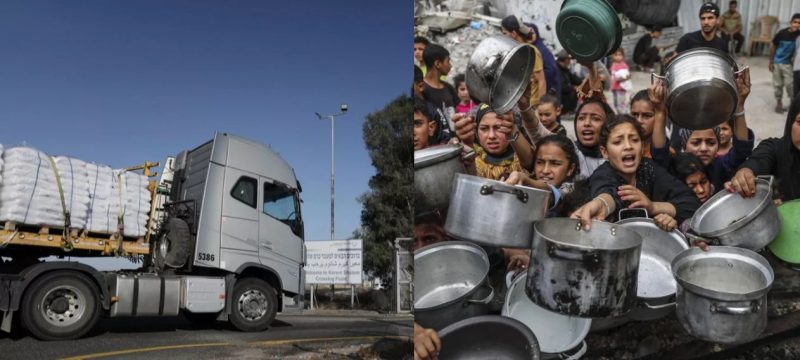The United Nations has confirmed that despite aid trucks beginning to enter Gaza after an 11-week blockade, no humanitarian assistance has yet been distributed within the territory.
Israeli authorities reported that 93 trucks carrying essential items such as flour, baby food, medical supplies, and pharmaceuticals crossed into Gaza on Tuesday through the Kerem Shalom crossing. However, the UN clarified that while the trucks reached the Palestinian side, the aid has not been handed over to those in need.
Read more: Limited Aid Enters Gaza Amid Global Outcry and Mounting Starvation Fears
UN spokesperson Stéphane Dujarric explained that a UN team waited for several hours for Israeli clearance to access the delivery area but was ultimately unable to transfer the supplies to the UN’s warehouse inside Gaza. “Unfortunately, they were not able to bring those supplies into our warehouse,” he stated.
Israel had agreed on Sunday to permit a “basic amount of food” into Gaza, where experts have repeatedly warned of an impending famine. International criticism of Israel is mounting over the limited scale of aid allowed.
The United Kingdom announced it would halt trade talks with Israel, with Prime Minister Sir Keir Starmer condemning Israel’s military actions in Gaza as “morally unjustifiable” and labeling the situation “intolerable.” Similarly, Kaja Kallas, the European Union’s foreign policy chief, said the bloc would review its trade agreement with Israel due to ongoing hostilities.
Dujarric described the aid delivery as “complex,” explaining that Israel requires UN teams to unload supplies on the Palestinian side of Kerem Shalom and then reload them for separate transport after Israeli forces secure access within Gaza. While he viewed the arrival of supplies as a positive development, he emphasized it was only “a drop in the ocean” compared to the needs, noting that UN agencies estimate 600 trucks are required daily to address Gaza’s escalating humanitarian crisis.
UN humanitarian chief Tom Fletcher warned on the BBC that thousands of infants could die without immediate aid. He estimated that 14,000 babies suffering from severe acute malnutrition face life-threatening conditions within 48 hours if supplies are delayed.
In response to this figure, the United Nations Office for the Coordination of Humanitarian Affairs (UNOCHA) clarified that approximately 14,100 children aged six to 59 months are expected to suffer acute malnutrition over the coming year, according to the Integrated Food Security Phase Classification (IPC) report.
UNOCHA spokesman Jens Laerke stressed the critical urgency of the aid, stating, “We know for a fact that there are babies in urgent, life-saving need of these supplements. Without them, their lives are at mortal risk.”
Hamas-run Gaza health authorities reported that 57 children have died from malnutrition during the 11-week blockade.
In the United States, Secretary of State Marco Rubio welcomed Israel’s decision to allow some aid into Gaza, telling the Senate Foreign Relations Committee, “We are pleased to see that aid is starting to flow in again.” Although he acknowledged the aid volume was insufficient, he considered the move a positive step.
Last Monday, the leaders of the UK, France, and Canada jointly called on Israel to “stop its military operations” and “immediately allow humanitarian aid to enter Gaza.” The UK also imposed sanctions targeting prominent Israeli settlers and groups linked to settlements as part of its response.
The current conflict began with a cross-border attack by Hamas on October 7, 2023, resulting in approximately 1,200 deaths and 251 hostages taken. Since then, Gaza’s health ministry reports more than 53,475 fatalities, including 3,340 since the recent escalation of the Israeli offensive.









